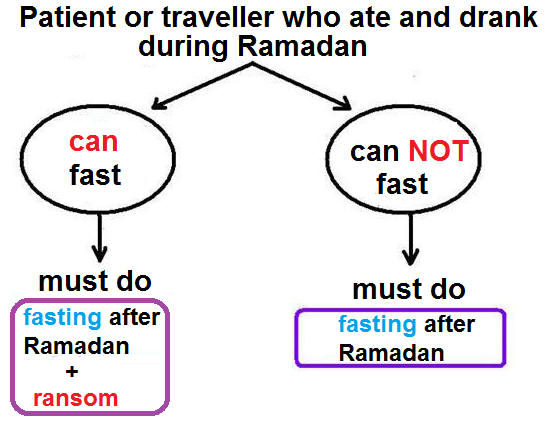the sick who can fast in Ramadan
فَمَنْ كَانَ مِنْكُمْ مَرِيضًا أَوْ عَلَى سَفَرٍ فَعِدَّةٌ مِنْ أَيَّامٍ أُخَرَ وَعَلَى الَّذِينَ يُطِيقُونَهُ فِدْيَةٌ طَعَامُ مِسْكِينٍ فَمَنْ تَطَوَّعَ خَيْرًا فَهُوَ خَيْرٌ لَهُ وَأَنْ تَصُومُوا خَيْرٌ لَكُمْ إِنْ كُنْتُمْ تَعْلَمُونَ (184) البقرة

ayyāman (=days) maʿdūdātin (=countable), faman (=who ever) kāna (=was)
minkum (=from you) marīḍan (= sick) aw (=or) ʿalā (=on) safarin (= a
journey, travelling) fa (=then) ʿiddatun (=same number, amont) min (=of)
ayyāmin (=days) ukhara (=other,another), wa (=and) ʿalā (= on, upen)
alladhīna (= those who are) yuṭīqūnahu (= capable,able)
fid'yatun
(=ransom, charge, payment): ṭaʿāmu (=food, feeding) mis'kīnin (poor man),
faman (= whoever) taṭawwaʿa (=voulanteered) khayran (=goodly) fahuwa
(=then it is) khayrun lahu (= good for him) , wa (= and) -an (= if)
taṣūmū (= you fast) khayrun lakum (it is good for you) in (=if) kuntum
taʿlamūna (you were knowing)
(2:184) Fasting is for a fixed number of days, and if one of you be
sick, or if one of you be on a journey, you will fast the same number of
other days later on. For those who are capable of it there is a ransom
(of) feeding a poor. And whoever volunteers good then it (is) better for
him. And to fast (is) better for you, if you know.
To summarize the meaning of the verse: If the patient (or traveler)
breaks the fast in Ramadan (while he is able to fast), then a
ransom is
imposed on him (ransom =feeding a poor)
general case: patients and travelers
As verse states [and if one of you be sick, or if one of you be
on a
journey, you will fast the same number of other days later on.].
So it is permissible for them (the general sick or general travelers) to
break the fast in Ramadaan (and then they have to fast after Ramadaan)
Special case: sick man or traveler who can fast
The verse states: For those who are capable of it (of fasting),
there is a ransom (of) feeding a poor.
Quran says : If you are sick and used your privilege of (eating and
drinking during the day of Ramadan), while your body health
can tolerate
fasting, then (in addition to fasting after Ramadan) you must pay a
ransom (which is feeding a poor man). Same thing applies if you are a
traveler and can fast during travelling (because you may have good
health or the road or travelling is easy on you).
Quran is using an Arabic word : (yuṭīqūnahu). It means (they
can do
it),I.e. they can do fasting.
Quran also is using an Arabic word : (fid'yatun). It means (ransom).
Literally it means : something you give to release yourself. Quran made
that fidyah (=fid'yatun) = giving a poor man some food or meal.
So there are two kind of patients :
(1) sick person that fasting will harm him or will be hard on him,
(2) sick person (who has mild
sickness), and fasting is easy on him (he can
fast). Same thing applies for traveler.
If the patient or traveler can fast , it is better to fast
Quran says [And whoever volunteers good then it (is) better for him. And
to fast (is) better for you, if you know.]
It is permissible for a sick person or traveler (NOT to fast) in
Ramadan, but the verse advises him to
volunteer (without being forced) to
fast (despite his illness or travel), because this is better for
him.
But of course, if the patient or traveler (who can fast) chooses to use the general permession and breaks fasting (chooses to eat), then he has to pay the ransom also
Diagram
To further clarify the meaning, this drawing divides the sick and the travelers into two parts, those who can not fast and those who can fast:

Hamed AlAwlaqi